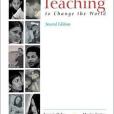《Teaching To Change The World》是McGraw-Hill Humanities/Social Sciences/Languages出版的圖書,作者是Jeannie Oakes,Martin Lipton
基本介紹
- ISBN:9780072407389
- 作者:Jeannie Oakes、Martin Lipton
- 出版社:McGraw-Hill Humanities/Social Sciences/Languages
- 出版時間:2002年8月14日
- 定價:USD 56.25
- 裝幀:Paperback
內容簡介
This is a highly current and engaging, multicultural, introduction to education and teaching -- both its challenges and its joys. Jeannie Oakes is a leading education researcher and director of the UCLA teacher education program. Martin Lipton is an education writer and consultant and has taught in public schools for 31 years. Together, they bring an excellent blend of theory ...(展開全部) This is a highly current and engaging, multicultural, introduction to education and teaching -- both its challenges and its joys. Jeannie Oakes is a leading education researcher and director of the UCLA teacher education program. Martin Lipton is an education writer and consultant and has taught in public schools for 31 years. Together, they bring an excellent blend of theory and applications to the text. This ground-breaking text responds to the current national crisis in teaching and teacher education, considers the values and politics that pervade education, and asks critical questions about how conventional thinking and practice came to be and who benefits from them. The text takes the position that a hopeful, democratic future depends on whether all students learn, and pays particular attention to inequalities associated with race, social class, language, gender, and other social categories and looks for alternatives to the inequalities. The text provides a solid research base and practical treatment of essential topics that locates these topics within cognitive, sociocultural, and constructivist perspectives on learning, and within democratic values. The text infuses issues of diversity throughout its discussion of traditional elements of schools and teaching -- learning, curriculum, instruction, etc. It presents educational foundations and history as alive and active in today’s schools, and treats them as useful concepts for students to use as they think about and respond to more transitory, current “headline” issues, such as charter schools, vouchers, st

